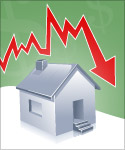
Is it time to buy a house or investment property?
It Depends…
If you need a place to live and want to own a house, why not? Prices in some areas are fairly reasonable. But if you're speculating, our guess is that you'll get a better deal if you wait.
Why? House prices may be firming in some areas – that's what the Case-Shiller numbers seem to show. But nationwide, they are probably headed down for quite a while longer.
Here are four reasons why:
First, as you know, this is a depression. It will probably be long. And deep. You wouldn't know it from looking at the stock market or reading the news. The Dow went up another 114 points yesterday. Oil rose to $71. And the dollar – anticipating inflation – fell to $1.44 per euro.
But that's what bounces are supposed to look like. They look good enough so that people mistake them for the real thing… and get suckered into more losses.
This is a depression. Depressions drag down asset prices. Typically, prices become much more reasonable. And then they reach UNREASONABLE levels. House prices have become reasonable. Now they will become unreasonably cheap…
Second, waves of resets and foreclosures are still washing over the housing market. We're only half way through the foreclosure process. There are more than 18 million empty houses in America. A news report yesterday told of a 32-storey apartment building in Florida with only one lonely tenant. And still coming up are more refinancings… more drowning homeowners… and more people giving up on homeownership altogether. The bubble era created new households at the rate of 1.2 million per year. Practically every one of them wanted to get in on the housing boom. Now, there are only 500,000 new households per year. And few of them still believe that housing is the route to wealth. At the current rate, it will take many years to fill up all of America's empty houses.
Third, incomes are falling. Property crashed because people with average incomes could no longer afford to buy the average house. Now, they can afford even less. Ken Rogoff estimates that the consumer needs 6-8 years to pay his debts down to a more reasonable level. Part of that deleveraging process will mean getting rid of heavy mortgage debt – one way or another.
Fourth, there are too many houses that are too big… and in the wrong places. Big houses were a status symbol in the bubble years. Now they're a symbol of extravagance and error. Plus, they're expensive to own. People will want to dump them – even if they can afford them. There was far too much building in the outlying suburbs of the sand states too – Arizona, Nevada, California and Florida. Those houses may have to be abandoned as people are forced to move closer to where the jobs are.
There are also a couple of more technical reasons why the Case-Shiller numbers may be erring on the bright side: seasonal adjustments and a changing mix of houses sold. But our guess is that real house prices – adjusted for inflation – will continue going down for many more years.




